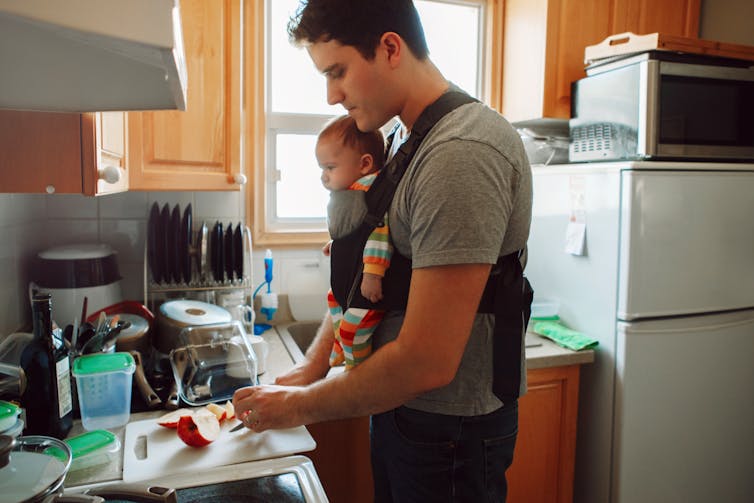
UK campaign group The Dad Shift is staging a “dad strike” on June 11, to protest the poor paternity leave available to fathers in the UK. Fathers and other parents are being asked to “picket or pickup” – to leave work and join protests at government buildings, or use this time to do the school or nursery run.
My research suggests that a poor offer of leave for fathers means they do not believe either the UK government or their employers view their participation in childcare as important.
UK fathers can take up to two weeks’ leave at the time of the birth of their child, but it is paid well below the living wage. This leave is also only eligible to fathers who have been continuously employed by their employer for at least 26 weeks up to the 15th week before the baby is due.
Paternity leave was introduced in 2003, when maternity leave was extended from 18 to 26 and later 52 weeks. This has resulted in a stark inequality between mothers’ and fathers’ opportunity to take time with their new baby. The UK paternity leave offer also compares poorly against leave offered for fathers in other countries, ranking 40th out of 43 OECD countries
And despite the small amount of leave offered to fathers in the UK, only 59% actually take it. This is mostly due to the poor pay, but fathers also report facing pressure from work that inhibits their use of the leave options available to them.
Sharing leave
Shared parental leave, introduced in 2015 throughout the UK, allows parents to share up to 50 weeks between them. But it has failed to alter parental leave patterns: only 5% of fathers take any shared parental leave.
The low remuneration offered – currently £187.18 a week, if taken within the first nine months, or no pay at all thereafter – again has affected how many men make use of this scheme. They may also feel they are “stealing” the mother’s leave, because a father taking shared parental leave means the mother has to go back to work sooner.
Read more: Shared parental leave has failed because it doesn't make financial or emotional sense
But it’s really important that fathers take time with their babies. When fathers take leave, there are multiple documented benefits for the family and beyond.

Dads’ time at home with their children can help establish a bond between father and child. Research has found that a father who spends time with his young baby, and does activities with them, is more likely to be an engaged parent as his child gets older. There are also potential improved developmental outcomes for children. These benefits are increased the more time fathers are able to spend with their children.
Wider benefits
Mothers also benefit from having their partner off work and with them, particularly during the first weeks and months after giving birth.
I collected diary entries and held interviews with new parents about their parental leave. The difference that fathers taking extended paternity leave at the time of birth made to mothers was palpable. All these mothers reported a smoother and happier transition to parenthood.
On the other hand, mothers whose partners returned to work at two weeks or earlier reported significant challenges. Some even said they felt “traumatised” when the paternity leave ended. “It’s harrowing when the father goes back to work,” one mother told me. “I was, like, hysterical from lack of sleep and not being able to breastfeed.”
As more and more births are via caesarean section – an estimated 31% in the UK – it is even more important that mothers have a partner present at this time. Mothers who have a c-section have limited mobility and will generally require greater levels of support for longer than mothers who have a vaginal birth.
Beyond the family, fathers’ participation in leave is also good for gender equality. Fathers who take leave are more likely to share parenting tasks later and demonstrate more understanding around what parenthood involves.
These benefits are magnified when fathers take leave alone – whether through shared parental leave taken alone in the UK or, as in some European countries, an extended “daddy’s quota” of leave taken after the mother returns to work.
This can also have knock-on benefits for gender equality in paid work. The gender pay gap in the UK is 7% – women working full-time earn 7% less per hour than men. As documented by Nobel prize winner Claudia Goldin, the biggest factor in the gender pay gap is the transition to parenthood. A greater uptake of leave by fathers can shift the established roles of mother-as-carer and father-as-breadwinner.
Read more: Mothers are more likely to work worse jobs – while fathers thrive in careers
Besides all these documented benefits of paternity leave, perhaps one of the most potent is that fathers too are part of a family. To deny them independent and well-supported access to parental leave, at least in a comparable way to mothers, is simply unjust. They shouldn’t miss out on this valuable time with their children – and nor should children miss out on time with their fathers.
Katherine Twamley's research on parental leave was funded by the British Academy and the Leverhulme Trust.
This article was originally published on The Conversation. Read the original article.







